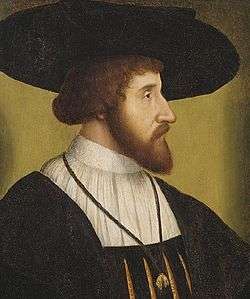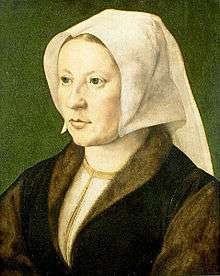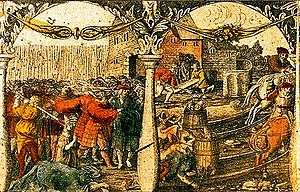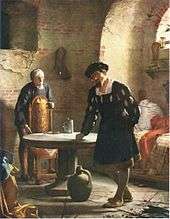Christian II of Denmark
Christian II (1 July 1481 – 25 January 1559) was a Scandinavian monarch under the Kalmar Union. He reigned as King of Denmark and Norway from 1513 until 1523 and of Sweden from 1520 until 1521. From 1513 to 1523, he was concurrently Duke of Schleswig and Holstein in joint rule with his uncle Frederick.
| Christian II | |
|---|---|
 | |
| King of Denmark and Norway (more...) | |
| Reign | 22 July 1513 – 20 January 1523 |
| Coronation | 11 June 1514, Copenhagen 20 July 1514, Oslo |
| Predecessor | John |
| Successor | Frederick I |
| King of Sweden (more...) | |
| Reign | 1 November 1520 – 23 August 1521 |
| Coronation | 4 November 1520 Storkyrkan, Stockholm |
| Predecessor | John II |
| Successor | Gustav I |
| Born | 1 July 1481 Nyborg Castle |
| Died | 25 January 1559 (aged 77) Kalundborg Castle (as prisoner) |
| Burial | |
| Spouse | |
| Issue among others... | John Dorothea, Electress Palatine Christina, Duchess of Milan |
| House | Oldenburg |
| Father | John, King of Denmark |
| Mother | Christina of Saxony |
| Signature | |
As king, Christian tried to maintain the Kalmar Union between the Scandinavian countries which brought him to war with Sweden, lasting between 1518 and 1523. Though he captured the country in 1520, his subsequent slaughter of leading Swedish nobility, known as the Stockholm Bloodbath, caused the Swedes to rise against his rule. He was deposed in a rebellion led by the nobleman and later king of Sweden Gustav Vasa. He attempted to bring in a radical reform of the Danish state in 1521–2, which would have strengthened the rights of commoners at the expense of the nobles and clergy. The nobility rose against him in 1523, and he was exiled to the Netherlands, ceding the Danish throne to Fredrick I. After attempting to reclaim the thrones in 1531, he was arrested and held in captivity for the rest of his life, first in Sønderborg Castle and later at Kalundborg Castle. Supporters tried to restore him to power both during his exile and his imprisonment but they were defeated decisively during the Count's Feud in 1536. Christian died at Kalundborg in 1559.
Christian married Isabella of Austria, granddaughter of Maximilian I, Holy Roman Emperor, in 1515. Isabella died in 1526, after which her family took Christian's three children from him. His relationship with his mistress, Dyveke Sigbritsdatter, pre-dated his marriage and continued until her death in 1517. Christian's persecution of her supposed murderer contributed to his political isolation and downfall. Dyveke's mother, Sigbrit Willoms, became an influential councillor and followed Christian into exile.
Early life
Christian was born at Nyborg Castle in 1481 as the son of John, King of Denmark and his wife, Christina of Saxony. Christian descended, through Valdemar I of Sweden, from the House of Eric, and from Catherine, daughter of Inge I of Sweden, as well as from Ingrid Ylva, granddaughter of Sverker I of Sweden. His rival Gustav I of Sweden descended only from Sverker II of Sweden and the House of Sverker.
Christian took part in his father's conquest of Sweden in 1497 and in the fighting of 1501 when Sweden revolted. He was appointed viceroy of Norway in 1506, and succeeded in maintaining control of this country.[1] During his administration in Norway, he attempted to deprive the Norwegian nobility of its traditional influence exercised through the Rigsraadet privy council, leading to controversy with the latter.
In 1513, he succeeded his father as king of Denmark and Norway.[1] Christian's succession to the throne[of Norway and Denmark?] was confirmed at the Herredag assembly of notables from the three northern kingdoms, which met at Copenhagen in 1513. The Swedish delegates said, "We have the choice between peace at home and strife here, or peace here and civil war at home, and we prefer the former." A decision as to the Swedish succession was therefore postponed.[2] Christian's corronation as king of Denmark and Norway took place in 1514.[1]
Personal life

Whilst visiting Bergen in 1507 or 1509, Christian fell in love with a Norwegian girl of Dutch heritage, named Dyveke Sigbritsdatter. She became his mistress and remained with him until Dyveke's death. Their relationship was not interrupted by Christian's marriage to Isabella of Austria, the granddaughter of Holy Roman Emperor Maximilian I. They married by proxy in 1514.[3] Isabella was brought to Copenhagen a year later, and the marriage was ratified on 12 August 1515.
Dyveke died in 1517, and Christian was lead to believe that the magnate Torben Oxe had poisoned her. Oxe's status meant that he should have been tried by the Council of State, but instead he was brought to trial by a common jury at Solbjerg outside Copenhagen. He was found guilty and executed in November 1517. This act precipitated the division between the king and aristocracy that ultimately led to Christian's deposition.[4]
Christian's chief counsellor was Dyveke's mother, Sigbrit Willoms. Christian appointed her controller of the Sound Dues of Øresund, and took her advice on all financial matters.[4][2] A bourgeoise herself, she acted to extend the influence of the middle classes, and formed an inner council, which competed with the Rigsraadet for power. Her influence was resented by the aristocracy, who blamed her for the king's favouring the working classes.[2] However, Mogens Gøye, the leading man of the council, supported the king as long as possible.
Reconquest of Sweden
Christian was meanwhile preparing for the inevitable war with Sweden. The anti-Danish faction, headed by the regent Sten Sture the Younger, was opposed by the pro-Danish party lead by Archbishop Gustav Trolle. In 1517 Christian dispatched ships and soldiers to the relief of the archbishop's fortress of Stäket, but was defeated by Sture and his peasant levies at Vedila. A second attempt the following year was also frustrated by Sture's victory at the Battle of Brännkyrka.[4][2]
A third attempt made in 1520 with a large army of French, German and Scottish mercenaries proved successful. Sture was mortally wounded at the Battle of Bogesund on 19 January, and the remaining rebel forces were suppressed in April at the bloody Battle of Uppsala. Under the leadership of Sture's widow Christina Gyllenstierna, Stockholm held out until September 1520. Ultimately Christian was crowned by Trolle in November, with the agreement of the Swedish Privy Council (Riksråd), who had, however, extracted an indemnity for the past and guarantee that Sweden should be ruled according to Swedish laws and custom.[5][2]
Stockholm Bloodbath

Three days after the coronation, Archbishop Trolle accused the followers of Sture of heresy for their part in the rising against him. Gyllenstierna used the fact that the Swedish Diet had made a 'swearing in common' (sammansvärjning) in 1517, which had bound the nobles to Sture's cause, in defence of her husband's followers. However, Christian seized on this as an opportunity to cement his control over Sweden by removing his opponents. He convened an ecclesiastical court which condemned all parties to the swearing in common. On 8 and 9 November eighty-two Swedish noblemen were executed at Stockholm castle, including the bishops of Skara and Strängnäs. As well as Sture's supporters, who had formed Trolle's original list, Christian's suspicious nature led him to even execute supporters of the Kalmar Union. The bodies of Sten Sture and his child were dug up and burnt. Gyllenstierna and other noble Swedish ladies were sent as prisoners to Denmark.[6][2]
The bloodbath, rather than cementing Christian's control of the Swedish throne, lead in short order to Sweden's secession from the Kalmar Union. Didrik Slagheck, whom Christian appointed to the bishopric of Skara and as one of the three regents of Sweden, proved brutal and inept. The remaining Swedish nobility, appalled by the bloodbath, rose against Christian and the Swedish Diet elected Gustav Vasa regent and subsequently King of Sweden.[7][2] On account of the massacre Christian is remembered in Sweden as Christian the Tyrant (Kristian Tyrann).[8]
Legal reforms and downfall
In June 1521, the Danish king paid a visit to Charles V in the Netherlands, where he remained for some months. He visited most of the large cities, made the personal acquaintance of Quentin Matsys and Albrecht Dürer, and met Erasmus, with whom he discussed the Protestant Reformation. Directly upon his return to Denmark in September 1521 Christian issued two bodies of laws – the Town Law and the Land Law – which governed respectively trade and the behaviour of the clergy. The Town Law strengthened the rights of tradesmen and peasants at the expense of the nobility. Trade was reorganised and was to be conducted solely through market towns, which were to be governed by officials appointed by the king. Trading in peasants was forbidden, and peasants were given the right to negotiate the terms of their tenure with the nobility. The Land Law permitted clergy to marry, and gave some control of the church over to the state. The new laws were radical, progressive, and perceived by the nobility and bishops as an existential threat.[9]
By 1522, Christian was running out of allies. In an attempt to set up a Danish-centered trading company in direct competition with the Hanseatic League, Christian had raised the sound tolls, which affected trade between Sweden and the Hanseatic towns.[10] As a consequence, Lübeck and Danzig joined the newly independent Sweden in war against Denmark. Domestic rebellion against Christian started in Jutland. On 20 January 1523, the herredag at Viborg offered the Danish crown to Christian's uncle, Duke Frederick of Holstein. Frederick's army gained control over most of Denmark during the spring, and in April 1523 Christian left Denmark to seek help abroad. On 1 May, he landed at Veere in Zeeland.[11][2]
Exile and imprisonment

In exile Christian led a humble life in the city of Lier in the Netherlands, waiting for military help from his brother-in-law Charles V. Christian corresponded with Martin Luther and he became a Lutheran for some time; he even commissioned a translation of the New Testament into Danish. Isabella died in January 1526, and Christian's children were taken by her family so as not to be raised as heretics. Popular agitation against Fredrick I in Denmark centered on Søren Norby, who gathered an army of peasants in Scania, but was defeated in 1525.[12]
By 1531, Christian had reverted to Catholicism and reconciled with the Emperor. He took a fleet to Norway, and landed in Oslo to popular acclaim in November 1531. Christian failed to subdue the fortresses of northern Norway, however, and accepted a promise of safe conduct from Fredrick I. [13]
Frederick did not keep his promise, and Christian was kept prisoner for the next 27 years, first in Sønderborg Castle until 1549, and afterwards at the castle of Kalundborg. Stories of solitary confinement in small dark chambers are inaccurate; King Christian was treated like a nobleman, particularly in his old age, and he was allowed to host parties, go hunting, and wander freely as long as he did not go beyond the Kalundborg town boundaries.[2]
Fredrick I died in April 1533, and the Danish Council of State was at first unable to choose a successor. The mayor of Lübeck, Jürgen Wullenwever, took advantage of the resulting interregnum to conspire for the restoration of Christian II to the throne of Denmark. He formed an alliance with two prominent nobles, Ambrosius Bogbinder and Jørgen Kock, mayor of Malmö. With Christopher, Count of Oldenburg as his military commander he succeeded in seizing Scania and Zeeland in the name of Christian II in a conflict known as the Count's Feud. However, Fredrick's eldest son, also named Christian, raised an army in Holstein which, lead by Johann Rantzau, took in turn Holstein, Jutland and Zeeland in a series of brilliant military manoeuvers. He formed an alliance with Gustav Vasa, who subdued Scania, and took the throne as Christian III of Denmark. Christian II remained in prison in Kalundborg.[14]

Christian II died in January 1559, a few days after Christian III.[2] The new king, Frederick II, ordered that a royal funeral be held in his memory. He is buried in Odense next to his wife, parents, and son John,[lower-alpha 1] who died in the summer of 1532.[15]
Legacy
Christian II is one of the most discussed of all Danish kings. He has been regarded as both a hypocritical tyrant and a progressive despot, who wanted to create an absolute monarchy based upon "free citizens". His psychological weaknesses have caught the interest of historians, especially his frequently mentioned irresolution, which as years passed seemed to dominate his acts. Christian clearly made too many enemies. Furthermore, the Danish middle class was still not strong enough to support royal power. However some of his ambitions were fulfilled by the victory of absolutism in 1660.
Jean Sibelius composed in 1898 incidental music King Christian II to a play about the king, and derived from it a suite.
Issue
.jpg)
Christian II had six children by his wife, Isabella of Austria (1501–1526), only three of whom survived infancy and two reached adulthood. They were:
| Name | Birth | Death | Notes |
|---|---|---|---|
| John | 21 February 1518 | 2 August 1532 | Heir to the thrones of Denmark, Norway and Sweden.[16] |
| Philip Ferdinand | 4 July 1519 | 1520 | Twin |
| Maximilian | 4 July 1519 | 1519 | Twin |
| Dorothea | 10 November 1520 | 31 May 1580 | Married in 1535, Frederick II, Elector Palatine and had no issue.[17] |
| Christina | c.1522 | c.1590 | Married in 1533, Francis II Sforza and had no issue. Married again in 1541, Francis I, Duke of Lorraine and had issue.[18] |
| Stillborn son | January 1523 | January 1523 | Unnamed |
Notes
- Hans in Danish
Citations
- Lockhart 2007, p. 12.
- Bain 1911.
- Lockhart 2007, p. 13.
- Lockhart 2007, p. 14.
- Lockhart 2007, p. 15.
- Lockhart 2007, pp. 15–16.
- Lockhart 2007, p. 16.
- Reiter 1943.
- Lockhart 2007, pp. 17–18.
- Lockhart 2007, pp. 14,18.
- Lockhart 2007, pp. 18–19.
- Lockhart 2007, pp. 20–21,61.
- Lockhart 2007, p. 22.
- Lockhart 2007, pp. 25–28.
- Lockhart 2007, p. 25.
- Bricka 1887, pp. 566–567.
- Bricka 1887, pp. 306–307.
- Bricka 1887, pp. 573–574.
References
- Bain, Robert Nisbet (1911). . In Chisholm, Hugh (ed.). Encyclopædia Britannica. 6 (11th ed.). Cambridge University Press.
- Bricka, Carl Frederik (1887). Dansk biografisk Lexikon. Copenhagen: Gyldendal. Retrieved 5 July 2020.
- Lockhart, Paul Douglas (2007). Denmark, 1513-1660 : the rise and decline of a Renaissance monarchy. Oxford University Press. ISBN 9780199271214.
- Reiter, Paul Johann (1943). Kristian Tyrann. Personlighet, själsliv och livsdrama (in Swedish). Witting, Gustaf (tr). Natur och kultur.
External links
| Wikimedia Commons has media related to Christian II of Denmark. |
- The Royal Lineage at the website of the Danish Monarchy

Christian II Born: 2 July 1481 Died: 25 January 1559 | ||
| Regnal titles | ||
|---|---|---|
| Preceded by John |
King of Denmark and Norway 1513–1523 |
Succeeded by Frederick I |
| Duke of Holstein and Schleswig 1513–1523 with Frederick I |
Succeeded by Frederick I and Christian III | |
| Vacant Title last held by John II |
King of Sweden 1520–1521 |
Vacant Title next held by Gustav I |
